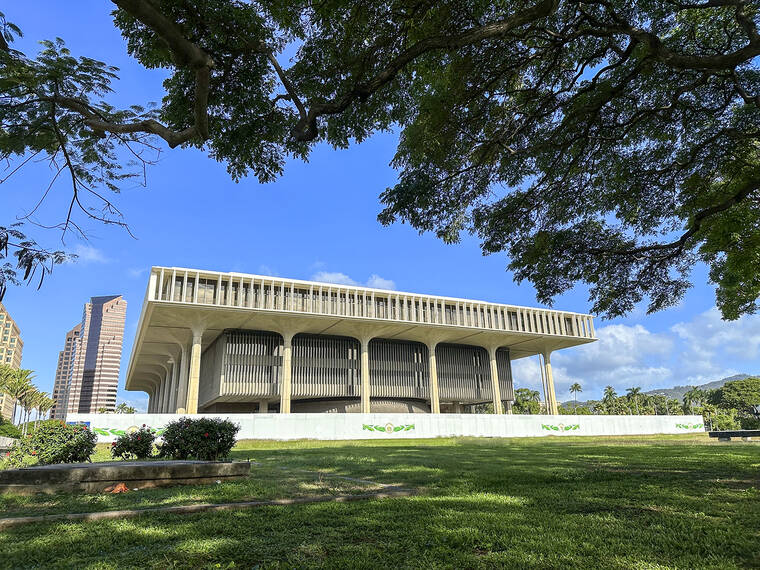Wildfire prevention and helping Maui recover from flames top the agenda for Hawaii lawmakers
HONOLULU — Hawaii lawmakers are due to convene this week for the first time since the burning of historic Lahaina awakened the state to the deadly and costly threat posed by wildfires in an age of climate change.
The tragedy refocused the attention of lawmakers. Now, fighting and preventing wildfires and helping the island of Maui recover from the flames top the agenda as Hawaii’s Legislature returns for a new session this week.
ADVERTISING
“It really kicked us into gear in a different way,” said state Rep. Nadine Nakamura, the House majority leader and a Democrat.
The Aug. 8 blaze killed 100 people, destroyed more than 2,000 buildings and displaced 12,000 people. Experts estimate it will cost $5.5 billion to replace the structures exposed to the fire.
Investigators are still studying how the fire began. Heavy winds whipped up by a powerful hurricane passing south of Hawaii helped the flames spread quickly, as did drought and non-native fire-prone grasses.
Another fire in early August burned about 20 homes in Kula, a town on the slopes of Haleakala volcano.
House Democrats will look at wildfire prevention needs statewide and develop an understanding of what the state Department of Land and Natural Resources needs in order to do a better job, Nakamura said.
A House wildfire prevention working group formed after the fire recommended a range of new measures, including a public awareness campaign to prevent fires from starting and tax or insurance incentives for wildfire-safe structures. The working group recommended that the state maintain firefighting aircraft and other equipment specifically to fight wildfires.
The Senate majority said in a news release it was committed to forming a fire risk task force and seeking permanent funding for the Hawaii Wildfire Management Organization, which is a hub for wildfire prevention and mitigation.
Democrats have overwhelming majorities in both chambers, controlling 44 out of 50 seats in the House (one seat is vacant) and 23 out of 25 seats in the Senate. Gov. Josh Green, a Democrat, in December asked lawmakers to appropriate $425 million for the Maui cleanup and emergency housing, and millions more to reduce statewide wildfire risk.
Colin Moore, a University of Hawaii political science professor, said it was clear after Lahaina that state agencies need more money to manage forests and other natural resources. That could help revive a proposal considered last year to charge visitors for a yearlong pass to visit state parks and trails.
The bill would be popular during an election year, Moore said.
“That is the sort of thing legislators will want to advertise in their reelection campaigns,” he said.
Nakamura said the Maui fires exacerbated a problem that existed long before: the proliferation of vacation rentals around the state.
Thousands of Lahaina residents who lost their homes in the fire are still living in hotels five months after the blaze because there is not enough housing for them, even though tourists are renting condos in their midst. Many wildfire evacuees have left Maui because they can’t find a place to live.
Lawmakers could revisit legislation that has failed before that would give counties the authority to phase out short-term rentals, Nakamura said.
A University of Hawaii analysis estimates vacation rentals account for 15% of Maui’s housing stock. In Lahaina, the ratio is 40%.
Moore expects lawmakers to continue to try to address one of Hawaii’s most persistent challenges: the statewide housing shortage and high cost of housing that is fueling an exodus of Native Hawaiians and other local-born residents from the state.
“I think you’re going to see more of what we’ve seen in the past, which is trying to figure out what is the right mix of regulatory reforms and subsidies and rental assistance,” Moore said.
He said people needing affordable housing the most are a large, unorganized group that has little pull at the Legislature. Groups who care passionately about regulations restricting or slowing housing construction — for example, rules governing historic preservation or environmental regulation — are more readily able to mobilize and advocate, he said.
Nakamura said there will be a push for zoning to allow more housing on individual lots and for putting money into funds that subsidize affordable housing development.
There is widespread understanding that Hawaii needs more shelter for residents, Nakamura said, relaying how she has talked to business leaders and people in the tourism and health care industries who say their workers need housing.


